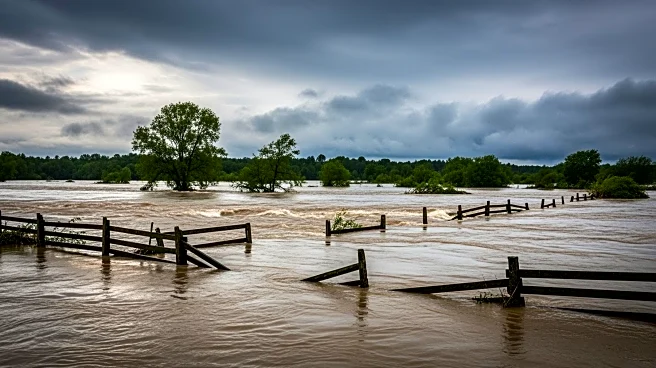What's Happening?
Severe flooding in Central Vietnam has resulted in the deaths of 90 individuals, with 12 others reported missing. The floods have caused extensive damage to infrastructure and agriculture, with over 1,154
homes damaged and approximately 186,000 houses inundated at the peak of the flooding. The Ministry of Agriculture and Environment reported that at least 80,000 hectares of rice and crops have been damaged. The provinces of Dak Lak and Khanh Hoa are experiencing deep flooding, leading to road and bridge collapses that have isolated hundreds of households. Authorities are working to restore access and clean up the damage. The National Center for Hydro-Meteorological Forecast predicts a gradual decrease in heavy rain starting November 25. Prime Minister Pham Minh Chinh has convened an urgent virtual meeting with ministries and local authorities to coordinate response and recovery efforts.
Why It's Important?
The flooding in Vietnam highlights the vulnerability of regions to extreme weather events, which can have devastating impacts on communities and economies. The estimated economic damage of at least 9 trillion dong ($340 million) underscores the financial strain such disasters can impose on affected areas. The destruction of agricultural land poses a threat to food security and the livelihoods of farmers, potentially leading to long-term economic challenges. The government's response and coordination efforts are crucial in mitigating the impact and facilitating recovery. This situation also emphasizes the importance of disaster preparedness and resilient infrastructure to withstand future events.
What's Next?
As the government continues to assess the damage and coordinate recovery efforts, the focus will likely be on restoring infrastructure and providing aid to affected communities. Repairing roads and bridges to reconnect isolated households will be a priority. Additionally, efforts to support farmers and restore agricultural productivity will be essential to prevent prolonged economic hardship. The government may also consider implementing measures to improve flood management and infrastructure resilience to better prepare for future storms.
Beyond the Headlines
The flooding in Vietnam may prompt discussions on climate change and its role in increasing the frequency and intensity of extreme weather events. This could lead to policy changes aimed at enhancing environmental protection and sustainable development. The international community may also offer support and resources to assist Vietnam in its recovery efforts, highlighting the importance of global cooperation in addressing climate-related challenges.











